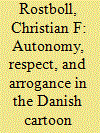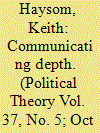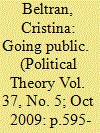| Srl | Item |
| 1 |
ID:
090897


|
|
|
|
|
| Publication |
2009.
|
| Summary/Abstract |
Autonomy is increasingly rejected as a fundamental principle by liberal political theorists because it is regarded as incompatible with respect for diversity. This article seeks, via an analysis of the Danish cartoon controversy, to show that the relationship between autonomy and diversity is more complex than often posited. Particularly, it asks whether the autonomy defense of freedom of expression encourages disrespect for religious feelings. Autonomy leads to disrespect for diversity only when it is understood as a character ideal that must be promoted as an end in itself. If it by contrast is understood as something we should presume everyone possesses, it provides a strong basis for equal respect among people from diverse cultures. A Kantian conception of autonomy can justify the right to freedom of expression while it at the same time requires that we in the exercise of freedom of expression show respect for others as equals.
|
|
|
|
|
|
|
|
|
|
|
|
|
|
|
|
| 2 |
ID:
090898


|
|
|
|
|
| Publication |
2009.
|
| Summary/Abstract |
This essay takes as its task the critical comparison of two thinkers who are rarely matched or studied in tandem: Jürgen Habermas and Maurice Merleau-Ponty. It stages a (largely) speculative dialogue between the two thinkers, considering not only the points of convergence but their likely objections to each other's accounts of communication and language. I will argue that Merleau-Ponty, whose own concerns significantly overlap with Habermas's, while simultaneously pulling in a different direction, serves as a useful counter-point to Habermas. This is so because Merleau-Ponty offers us an intersubjectivist account of praxis, from which can be extrapolated an ethics of communicative engagement between self, other, and world. Such a phenomenological and/or existential rereading of the central Habermasian problematic not only compensates for the notorious abstraction of Discourse Ethics, but better underscores possibilities for social transformation inherent in intersubjectivity and the lifeworld than are acknowledged by Habermas.
|
|
|
|
|
|
|
|
|
|
|
|
|
|
|
|
| 3 |
ID:
090896


|
|
|
|
|
| Publication |
2009.
|
| Summary/Abstract |
While other theorists have turned to Arendt's analysis of statelessness and superfluity to consider questions of immigration, "illegality," and the status of noncitizens, this essay argues that Arendt's account of labor and her nonconsequentialist account of action offer a richer optic for considering the undocumented in the United States. To explore this claim, this essay constructs an alternate account of the nationwide demonstrations for immigrant rights that occurred in 2006. Rather than defining "success" in terms of replicability or immediate legislative results, the author's analysis of the 2006 protests emphasizes the significance of noncitizens laying claim to the public realm. Considering Michael Warner's concept of counterpublics, the author argues that the demonstrations can be best understood as a moment of initiation and an inaugural performance of the political. Rereading Arendt's notion of animal laborans, the essay concludes by exploring the limitations of noncitizens invoking labor as a way to gain civic standing.
|
|
|
|
|
|
|
|
|
|
|
|
|
|
|
|